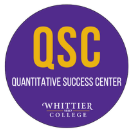Quantitative Success Center
The Quantitative Success Center promotes the attainment of quantitative literacy and academic success by providing comprehensive academic support for students and by offering empirically based pedagogical practices for faculty.
, Whittier College
Established: 2023
https://www.whittier.edu/qsc and https://qsc.whittier.domains/
Profile submitted by Paige Sturley
Vision and Goals
The Quantitative Success Center empowers students to achieve their academic goals by providing comprehensive support and resources in all quantitative courses. We strive to create a welcoming environment where all students feel comfortable seeking help and developing the skills they need to excel in their studies and beyond.
Center/Program Structure
The Quantitative Success Center (QSC) is an independent unit within Whittier College, operating under the Division of Academic Affairs. Internally, the QSC collaborates with the Center for Advising and Academic Success (CAAS) to support math placement testing for incoming first-year students and to coordinate general academic success programming throughout the semester. For faculty and professional development initiatives, the QSC partners with the Center for Teaching and Learning (CTL). Additionally, collaboration with academic departments across the college is an essential aspect of the QSC's role.
The QSC is staffed by two full-time employees: the Director and the Associate Director. The Associate Director reports to the Director, who in turn reports to the Dean of Faculty. The remainder of the QSC team includes part-time staff and student employees. Among them is a graduate student who assists with workshops and academic success programming, and a team of student workers who serve as tutors.
Are there advantages of being structured this way?
Are there particular challenges that result from this structure?
Funding
The QSC was started with a three-year grant. After the grant, the QSC will be supported by the college budget.
How has this funding structure influenced the undergraduate STEM education programming the center offers?
What are the specific advantages of having a center funded in this way?
What are the challenges?
Has this funding structure has changed over time?
Description of Programming
Tutoring: The QSC provides peer tutoring for quantitative based subjects.
Workshops: The QSC provides a wide variety of quantitative based workshops. The most popular workshops being an Excel series.
Math Placement Testing: The QSC handles all administration for math placement testing.
Summer Bridge: The QSC facilitates a math summer bridge program for incoming first-year students. The program is free for all who attend and includes lunch and daily on-campus field trips.
Professional Development: The QSC collaborates with the Center for Teaching and Learning to provide a wide variety of professional development opportunities for faculty.
Successes and Impacts
Evaluation and Assessment
How does your center demonstrate its value, both in terms of assessing its own programming and responding to external evaluation?
Elements Contributing to Success



![[creative commons]](/images/creativecommons_16.png)